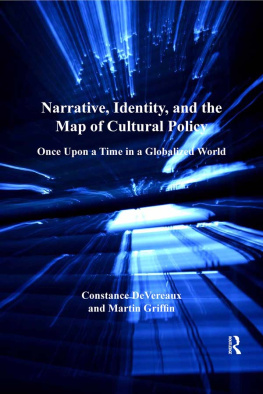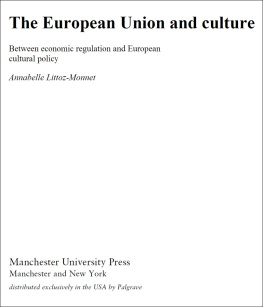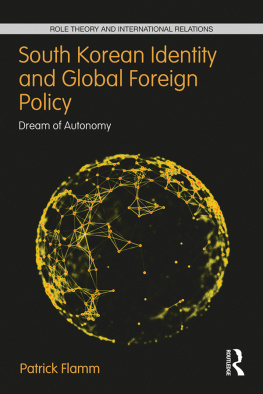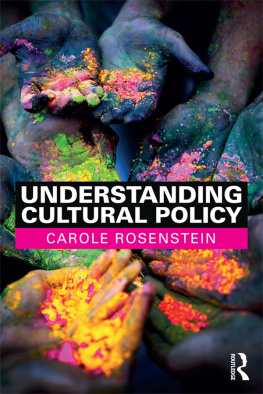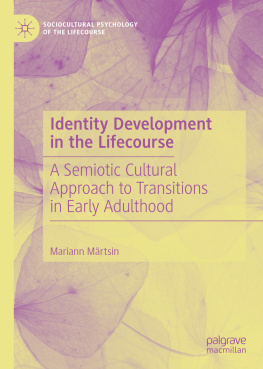NARRATIVE, IDENTITY, AND THE MAP OF CULTURAL POLICY
This book is dedicated to Kathryn Calafato,
student, colleague, accomplice, and friend
Narrative, Identity, and the
Map of Cultural Policy
Once Upon a Time in a Globalized World
CONSTANCE DEVEREAUX
Colorado State University, USA
MARTIN GRIFFIN
University of Tennessee, USA

First published 2013 by Ashgate Publishing
Published 2016 by Routledge
2 Park Square, Milton Park, Abingdon, Oxon OX14 4RN
711 Third Avenue, New York, NY 10017, USA
Routledge is an imprintof the Taylor & Francis Group, an informa business
Copyright Constance DeVereaux and Martin Griffin 2013
Constance DeVereaux and Martin Griffin have asserted their right under the Copyright, Designs and Patents Act, 1988, to be identified as the authors of this work.
All rights reserved. No part of this book may be reprinted or reproduced or utilised inany form or by any electronic, mechanical, or other means, now known or hereafterinvented, including photocopying and recording, or in any information storage orretrieval system, without permission in writing from the publishers.
Notice:
Product or corporate names may be trademarks or registered trademarks, and areused only for identification and explanation without intent to infringe.
British Library Cataloguing in Publication Data
A catalogue record for this book is available from the British Library
The Library of Congress has cataloged the printed edition as follows:
DeVereaux, Constance.
Narrative, identity, and the map of cultural policy : once upon a time in a globalized world/by Constance DeVereaux and Martin Griffin.
pages cm
Includes bibliographical references and index.
ISBN 978-1-4094-2546-5 (hardback)
1. Narration (Rhetoric)Social aspects. 2. Narration
(Rhetoric)Political aspects. 3. Cultural policy. 4. Transnationalism. 5. Globalization.
6. Nationalism and historiography. 7. StorytellingSocial aspects. 8. Storytelling
Political aspects. I. Griffin, Martin, 1956- II. Title.
PN212.D48 2013
306.4dc23
2013004544
ISBN 9781409425465 (hbk)
Contents
Preface
Once upon a time
Across languages and continents the above phrase is, with some cultural and rhetorical adjustments, the young childs formal introduction to the seductive universe of storytelling. One needs to experience that moment early in life, as it sets something in motion for the future. Later in life, however, the centrality of narrative becomes diffuse, refracted across the different segments and divisions of existence that come into being to complicate the simpler unities of childhood. We begin to reserve the pleasures of storytelling for certain areas of lifeleisure time with family and friends, limited professional contexts such as presentations or interviews, creative workand assume that other areas are not implicated in the subjectivity of narrative. In recent years, however, researchers and practitioners in various fields have come to embrace the idea that narrative styles and structures might be present across a much broader range of human activity and play a more significant role than previously assumed. The narrative turn, as it has been called, has returned an attentive focus to the interactions of tale, teller, and listener.
Once upon a time, therefore, the origins of this study were nothing more than a loose chain of conversations, discussions, and readings that the authors engaged in over several years. Then, as time went on, certain lines of thought in particular began to intersect: the way in which narrative has become an almost indispensable trope in public discourse of various kinds, but without the full implications of the word being confronted (for example, plot, framing, plausibility, voice, and other complex issues); the impression that the terms transnational (or transnationalism) and globalization appeared to be selected by speakers or writers on the basis of an implied story attached to the chosen term; and that in creative juxtaposition both lines of thought could open up a wider field of discussion about the ways in which cultural politics and cultural identity are being deployed and interpreted at our present moment in history. Our first foray into exploring these ideas was a jointly authored paper delivered at the 2006 International Conference on Cultural Policy Research in Vienna, Austria. Under the title International, Global, Transnational: Just a Matter of Words? the paper was later published by the online cultural policy journal Eurozine, and was translated and republished in 2007 by the Lithuanian journal Kultros barai, which both pleased and greatly surprised its authors.
We found the possibility of a jointly authored book a very stimulating prospect: namely, that going more thoroughly into the nature of narrative might spark the interest of those who deploy the term far from literary studies but may not have thought about its complexities and complications, and that the implications of narrative for public policy debates might also pique the interest of scholars of narrative. We also entertained the notion that those who concern themselves with issues of transnational movement and its implications, and the problems and possibilities of cultural citizenship in a world where maintaining national identity seems to be both tightening and easing (sometimes in the same place), might well appreciate the attempt to open up discussion on those themes from a quite different perspective than the ones usually offered. The narrative journey we embark upon in this volume, crossing terrain that might seem familiar in parts and quite alien in others, is the aim to forge a fresh approach to cultural policy inquiry, on the one hand, and to invite, on the other, those more familiar with narrative analysis to consider extending the ground of their theories and methods to the realm of cultural policy as well.
Openness to the transdisciplinary nature of our journey is an important requirement. Narrative, Identity, and the Map of Cultural Policy: Once Upon a Time in a Globalized World is the result of the collaboration between, on the one side, a political philosophy/public policy scholar, who is also an arts and cultural management expert, and an American literature professor on the other. The two authors broughtas one might expectnot only differing arrays of discipline-based approaches and skills to this project but also a set of stylistic prejudices and academic eccentricities that, of course, only start to appear problematic when they clash with those of the other field. Citing scholars by surname only (social sciences) or by both names (humanities); the necessity (or not) of writing brief summations of content covered at the end of each chapter; the defensive maneuvers that a discussion of causality can provoke; the cheerful equanimity (DeVereaux) versus the inexplicable resentment (Griffin) about the fact that the book is appearing as a social studies publication in any case and thus renders all the other arguments moot: the authors were never short of an opportunity for an enjoyable skirmish over parameters and conditions that they had no power to alter anyway. Writing this book was rather like the folktale of the hapless and timid peasant who gets lost one night and has to produce a story to escape a threatening fate in an eerie farmhouse, but cannot utter a syllable. He then flees into the night, has several weird and scary experiences, and returns to the farmhouse finally able to recount the story of what has happened to him.
Next page
